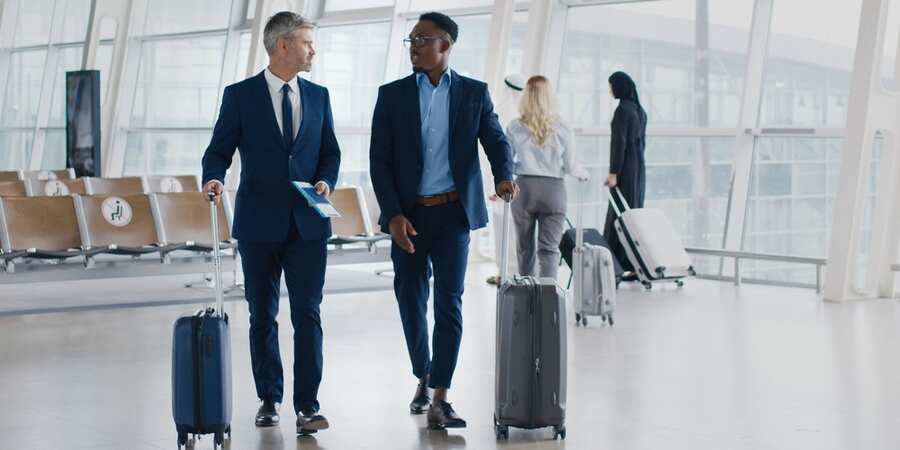Employees on corporate travel are the primary representative of a corporation’s values and reputation. They are the ambassadors for their organizations with the responsibility to accomplish the task at hand and uphold the image of the organization. Hence, besides knowing basic business etiquette, one must familiarize with local traditions such as saying namaste in India or bowing a bit in Japan to offer greetings. These intimate etiquettes ensure a gratifying experience for employees and individuals they interact with during meetings and other events. Knowing the dos and don’ts of business travel etiquette adds a unique flavor to your travel experience, ensuring an enjoyable and productive experience.
Do’s and don’ts of business travel etiquette
Business travel is crucial to fulfilling well-defined business objectives by meeting prospects, customers, associates, and vendors in diverse locations. Therefore, it is necessary for the employees to know about the travel etiquette that they must follow. Here are some of the dos and don’ts of business travel etiquette that will help you present the right image of your organization.
The do’s of business travel

1. Be punctual
While on corporate travel, one must respect the time of their clients and colleagues. Hence, employees should remain punctual to every meeting, rendezvous, flight, and hotel check-in. Further, being on time will help avoid unwanted delays and hassles.
2. Understand the itinerary
A business travel itinerary helps efficiently plan the business trip. Further, it lists down the important meetings and events corresponding to the trip in advance. Employees should thoroughly review the itinerary and research their travel and staying options to avoid last-minute trouble.
3. Knowing the local culture
Learning about local culture and pleasantries is essential to strike a chord in the very first meeting while on international travel. The first impression goes a long way in establishing long-term relationships. It sets the right tone for interactions. Further, it will help you to mingle in with the crowd in a much better way on an international trip.
4. Keep the travel documents handy
No one likes to keep waiting in long queues at the airport because someone else has lost their boarding pass. Additionally, keeping your business travel documents handy at the time of boarding a flight or checking in at a hotel is always recommended. Further, one must double-check all the necessary documents needed for the trip to avoid any major inconvenience.
5. Be polite and wait for your turn
One of the most praised etiquettes among all is being polite to the flight and hotel staff along with co-travelers. A kind word can get your work done in minutes, while a fit of anger can keep you waiting for hours. Also, you should not jump in queues and wait for your turn at the airport, restaurants, and more such places.
Suggested Read: Why Is Corporate Travel Planning Important For Businesses

The don’ts of business travel
1. Avoid being personal
While interacting with your prospects, clients, or associates, do not ask personal questions about family and kids or engage in gossip. One should keep professional and personal matters apart. Employees should be thoroughly professional during business travel and meetings.
2. Avoid criticizing local food or customs
People are sensitive about their local cuisine and other traditions. Hence, one should always appreciate and praise these aspects wholeheartedly. Further, don’t talk about the politics of the region unless your job inclines you to do so. One should understand the aim of corporate travel and therefore avoid any deliberate and unwanted confrontations.
3. Respect the law of the land
One should know the basic rules and regulations of the travel destination to avoid legal trouble. Further, one should ensure to abide by prevailing regulations like airport rules, customs rules, traffic rules, and local traditions. You can always take the help of travel managers of your organization or TMCs facilitating the travel for a clear perspective on a country’s rules.
4. Don’t make deliberate complaints
It is suggested you should provide feedback on a service or issue you had with the service to enhance the travel experience. However, complaining about every little issue that can easily be avoided is a big no. Further, condescending complaints are not warmly welcomed by anyone. Hence, you should remain calm and polite while making yourself heard or trying to get the best experience on your trip.
Conclusion
There is a lot at stake during business trips as employees need to meet business goals within timelines. Moreover, they are expected to withhold the integrity and dignity of the organization they represent. Hence, knowing the dos and don’ts of business travel etiquette is critical for the success or failure of a vital business tour.
Employees face several hassles during business trips, impacting their focus on corporate objectives. A SaaS-based travel management platform like Paxes streamlines business travel by allowing an app-based booking facility, providing real-time threat alerts, expense reporting, and much more.
Business Travel Etiquette FAQs
What are the important phone etiquettes while on a corporate trip?
Ideally, you must keep the phone in vibration mode while traveling. Speak in a soft tone while picking up the phone in the presence of others or move to a secluded place by asking permission. Ensure that no confidential information is being shared in a public place.
How to behave if the client sponsors accommodation?
Refrain from booking accommodation costing a fortune, such as a presidential suite. Limit your room service orders, as these may reflect poorly on your attitude.
Why adapting to local traditions is good business etiquette?
Each country has unique traditions of greeting. Knowing these will prevent awkward moments. Patting on the shoulder is bad manners in Japan, which may be acceptable in Mexico.
What are the good travel etiquettes for employees?
Being punctual, understanding the itinerary, and knowing the local culture are among some of the good corporate travel etiquette.
Should I exchange business cards during business trips?
Yes, it is best to exchange business cards at the beginning or the end of the business meetings. Make sure that you’re not disturbing the person you’re approaching. Make a small conversation with them and hand them your business card to show that you want to connect with them in the near future.
How can I navigate cultural differences when conducting business internationally?
Research the area thoroughly before visiting the destination. Communicate with the locals and try to understand their way of living. It is quite easy to hurt the feelings of foreigners especially when you’re not aware of their culture. Try to avoid the use of phrases, idioms, and jargon. You can even try watching some videos or web series online related to the area you are visiting.
Is it appropriate to use mobile devices during business meetings or meals?
It is not advisable to use your mobile phones unless in emergency situations. This shows that the meeting doesn’t matter to you and can cause deal cancellations.
What dining etiquette should I follow during business meals?
Each country has its own dining etiquette. Make sure to learn about their culture and tradition. Try their local food but don’t make comments about their taste. Be professionally dressed and show them how important the meeting is for you by reaching on time.
Should I tip when traveling for business?
This is a personal choice to tip taxi drivers, waiters, or waitresses during business trips. However, tipping them is a good option when you’re representing your company.
How can I be a considerate traveler in shared spaces, like hotels or airports?
Respect the privacy of others by not making noises around shared spaces. You should have eating etiquette. Do not watch videos at high volume on your devices. Lower your voice during conversations and phone calls. Dress appropriately and greet other passengers with a smile.
What should I do if I accidentally offend someone during a business trip?
It is always the best option to apologize quickly if you offend someone accidentally. You should not give any explanations or justifications as it may trigger them more and make the situation worse.



